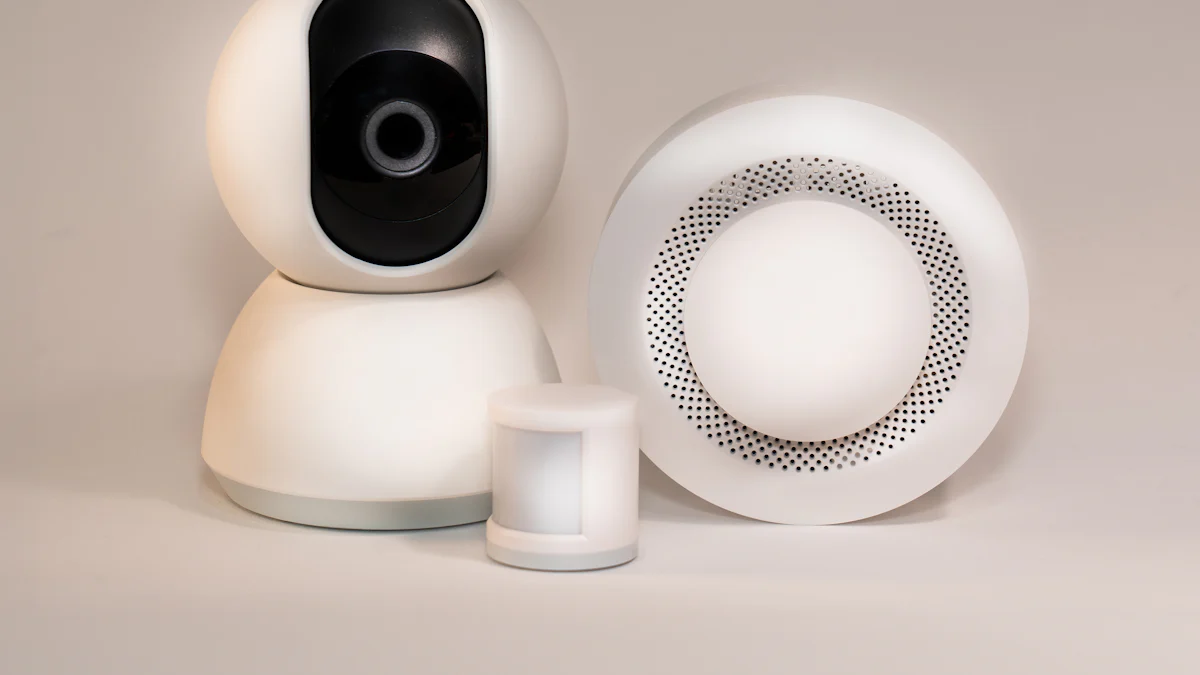The Role of Microsoft Azure in the Evolution of IoT

The Internet of Things (IoT) represents a transformative force in today's digital landscape. It connects billions of devices, enabling seamless communication and data exchange. The global IoT market, valued at approximately $595.73 billion in 2023, is projected to soar to $4,062.34 billion by 2032. This rapid growth underscores IoT's significance in driving technological advancements. Microsoft Azure emerges as a pivotal player in this evolution. It offers robust cloud services that empower developers to create innovative IoT solutions. Azure's comprehensive suite facilitates the management and deployment of IoT applications, fostering digital transformation across industries.
Understanding IoT
Definition and Importance
What is IoT?
The Internet of Things (IoT) refers to a network of interconnected devices that communicate and exchange data. These devices range from everyday household items to complex industrial machines. IoT enables these devices to collect and share data, creating a seamless flow of information. This connectivity transforms how individuals and businesses interact with technology.
Why IoT Matters
IoT holds significant importance in today's world. It enhances efficiency and productivity across various sectors. For instance, smart home devices automate daily tasks, while industrial IoT optimizes manufacturing processes. IoT also improves decision-making by providing real-time data insights. This technology fosters innovation and drives economic growth, making it a crucial component of modern society.
Current Trends in IoT
Growth Statistics
The IoT market continues to expand rapidly. In 2021, the automotive industry boasted over 80 million IoT devices. Industrial IoT projects accounted for 17% of global initiatives. The healthcare sector, though smaller, represented 6% of IoT projects worldwide. This growth highlights the increasing adoption of IoT across diverse industries.
Emerging Technologies
Emerging technologies play a vital role in IoT's evolution. Artificial intelligence (AI) and machine learning enhance IoT capabilities by enabling predictive analytics and intelligent automation. Edge computing processes data closer to the source, reducing latency and improving efficiency. These advancements drive IoT innovation, creating new opportunities for businesses and society.
Introduction to Microsoft Azure
Overview of Microsoft Azure
Cloud Computing Basics
Microsoft Azure stands as a leading cloud computing platform, offering a wide range of services. It provides infrastructure as a service (IaaS), enabling businesses to build, deploy, and manage applications through Microsoft's global network of data centers. Azure supports various programming languages, tools, and frameworks, making it versatile for developers.
Azure's Market Position
Azure holds a strong position in the cloud market, competing with giants like Amazon Web Services and Google Cloud. Its comprehensive suite of services, including machine learning and IoT security, attracts diverse industries. Azure's focus on sustainability and innovation further strengthens its market presence.
Azure's IoT Suite
Key Features
Azure's IoT Suite offers robust features tailored for IoT development. Azure IoT Hub acts as a central messaging hub, facilitating device connectivity and data management. It integrates seamlessly with other Azure services, enhancing data analysis and visualization. Azure Sphere ensures IoT security, protecting devices from potential threats.
Integration Capabilities
Azure excels in integration capabilities, allowing IoT data to connect with Microsoft ecosystem components like Microsoft 365 and Dynamics CRM. This connectivity enables businesses to create interoperable digital solutions. Azure's modular services, powered by Azure Arc, enhance collaboration and operational efficiency across industries.
Microsoft Azure's Role in IoT Development

Infrastructure Support
Scalability
Microsoft Azure provides scalable infrastructure that supports the dynamic nature of IoT applications. Businesses can easily adjust resources to accommodate fluctuating demands. This flexibility ensures that IoT solutions remain efficient and cost-effective. For instance, the DeviceTone IoT Solution for Hortica leverages Azure's scalability to enhance precision agriculture. This approach accelerates sustainability and introduces a disruptive business model known as "Grow as a Service." By utilizing Azure's scalable infrastructure, organizations can innovate without the constraints of traditional systems.
Security Features
Security remains a top priority in IoT development. Microsoft Azure offers robust security features to protect IoT devices and data. Azure Sphere, a comprehensive security solution, safeguards devices from potential threats. It provides multiple layers of protection, ensuring that data remains secure throughout its lifecycle. Azure's security features enable businesses to deploy IoT solutions with confidence, knowing that their assets are protected against cyber threats.
Data Management
Data Storage Solutions
Efficient data management is crucial for IoT success. Microsoft Azure offers a variety of data storage solutions tailored for IoT applications. Azure Blob Storage and Azure Data Lake provide scalable and secure storage options. These solutions enable businesses to store vast amounts of data generated by IoT devices. With Azure's data storage capabilities, organizations can manage their data effectively, ensuring that it remains accessible and secure.
Analytics and Insights
Data analytics plays a vital role in extracting valuable insights from IoT data. Microsoft Azure provides powerful analytics tools that enable businesses to analyze data in real-time. Azure Stream Analytics and Azure Machine Learning offer advanced capabilities for processing and interpreting data. The Automated Food Supply Delivery using Azure IoT Suite exemplifies how Azure's analytics tools unlock data for intelligent actions. This real-time supply chain visibility enhances decision-making and operational efficiency. By leveraging Azure's analytics and insights, organizations can drive innovation and improve their IoT solutions.
Key Features of Azure for IoT
Azure IoT Hub
Azure IoT Hub plays a crucial role in connecting IoT devices to the cloud. It enables reliable and secure communication between millions of devices and their backend solutions.
Device Connectivity
Azure IoT Hub provides seamless device connectivity. It supports a wide range of devices, allowing them to connect securely to the cloud. This connectivity ensures that devices can send and receive data efficiently. By using Azure IoT Hub, businesses can manage device identities and credentials, ensuring secure communication.
Message Routing
Message routing is another essential feature of Azure IoT Hub. It allows the routing of messages from devices to various endpoints. This capability enables real-time data processing and analysis. Businesses can configure rules to route messages based on specific criteria, optimizing data flow and enhancing decision-making.
Azure Digital Twins
Azure Digital Twins offers a powerful way to model and simulate physical environments. It helps create digital replicas of real-world spaces, providing valuable insights.
Real-time Simulation
Azure Digital Twins enables real-time simulation of physical environments. By creating digital models, businesses can visualize and analyze complex systems. This simulation helps in understanding how different components interact, leading to better planning and optimization.
Application Scenarios
Azure Digital Twins finds applications in various scenarios. For example, it can model smart buildings, tracking energy usage and optimizing space utilization. In manufacturing, it helps monitor equipment performance and predict maintenance needs. These applications demonstrate how Azure Digital Twins can transform industries by providing actionable insights.
Underlying Technologies
Machine Learning and AI
Predictive Maintenance
Machine learning and AI play a crucial role in enhancing IoT capabilities. Predictive maintenance uses these technologies to anticipate equipment failures before they occur. By analyzing device telemetry, Azure IoT can predict when maintenance should be performed on industrial assets. This approach minimizes downtime and reduces costs, ensuring efficient operations.
Intelligent Automation
Intelligent automation leverages AI to streamline processes and improve decision-making. In agriculture, for example, IoT devices equipped with AI can optimize irrigation and monitor crop health. This technology enhances productivity by providing farmers with accurate data, leading to better resource management and increased yields.
Edge Computing
Processing at the Edge
Edge computing processes data closer to the source, reducing latency and improving response times. Azure IoT Edge enables devices to perform real-time analytics and decision-making without relying on cloud connectivity. This capability is essential for applications requiring immediate data processing, such as autonomous vehicles and smart manufacturing.
Benefits and Use Cases
Edge computing offers numerous benefits, including enhanced security and reduced bandwidth usage. It supports various use cases across industries. For instance, in logistics, IoT trackers on vehicles provide real-time insights into location and efficiency. This information helps managers optimize fleet operations, leading to significant cost savings and improved asset utilization.
Specific Implementations
Industry Applications
Smart Cities
Smart cities utilize IoT technology to enhance urban living. Microsoft Azure plays a crucial role in this transformation. It provides the infrastructure needed for efficient data management and connectivity. Cities use Azure to monitor traffic patterns, manage energy consumption, and improve public safety. For example, IoT sensors collect data on traffic flow. Azure processes this data in real-time, allowing city planners to optimize traffic signals and reduce congestion. This approach leads to smoother commutes and lower emissions.
Healthcare Innovations
In healthcare, IoT innovations powered by Azure improve patient care and operational efficiency. Hospitals use IoT devices to monitor patients' vital signs continuously. Azure's data analytics tools process this information, alerting medical staff to any anomalies. This real-time monitoring enhances patient safety and allows for timely interventions. Additionally, Azure supports telemedicine platforms, enabling remote consultations and reducing the need for in-person visits. These innovations make healthcare more accessible and efficient.
Case Studies
Success Stories
Automated Food Supply Delivery using Microsoft Azure showcases the power of IoT in supply chain management. By leveraging Azure IoT Suite, companies achieve real-time supply chain visibility. This capability allows for automated food supply delivery, ensuring freshness and reducing waste. Azure's robust data analytics tools provide insights into logistics operations, optimizing routes and schedules. This success story highlights how Azure transforms traditional supply chains into efficient, data-driven systems.
Lessons Learned
From these implementations, several lessons emerge. First, integrating IoT with cloud platforms like Azure enhances scalability and flexibility. Businesses can adapt to changing demands without significant infrastructure investments. Second, real-time data processing is vital for timely decision-making. Azure's capabilities in handling massive data repositories and telemetry analytics prove invaluable. Lastly, security remains paramount. Azure's comprehensive security features protect sensitive data, ensuring trust in IoT solutions. These lessons guide future IoT deployments, paving the way for continued innovation.
Future of IoT with Microsoft Azure

Upcoming Developments
New Features
Microsoft Azure continues to innovate by introducing new features that enhance IoT capabilities. These advancements focus on improving connectivity, security, and data management. Azure's commitment to innovation ensures that businesses can leverage cutting-edge technology to optimize their IoT solutions. By integrating advanced analytics and machine learning, Azure empowers organizations to gain deeper insights from their IoT data.
Strategic Partnerships
Strategic partnerships play a crucial role in Azure's IoT strategy. Collaborations with industry leaders enable Azure to expand its ecosystem and offer more comprehensive solutions. These partnerships facilitate the integration of Azure's IoT services with other platforms, enhancing interoperability and functionality. As a result, businesses can create more robust and scalable IoT applications.
Challenges and Opportunities
Addressing Security Concerns
Security remains a significant challenge in IoT development. Microsoft Azure addresses these concerns by providing robust security features. Azure Sphere, for example, offers multiple layers of protection for IoT devices. By prioritizing security, Azure ensures that businesses can deploy IoT solutions with confidence, safeguarding their data and assets from potential threats.
Expanding IoT Ecosystem
The expansion of the IoT ecosystem presents both challenges and opportunities. Azure's flexible and open platform supports a wide range of devices and applications. This adaptability allows businesses to innovate and scale their IoT solutions efficiently. Barry Luijbregts, an expert in Azure IoT Hub projects, emphasizes that Azure IoT Hub is particularly beneficial for larger organizations. This scalability enables companies to manage vast networks of devices seamlessly.
"Beyond the technical capabilities, the strategic implementation of Azure in IoT projects can be complex and requires expert guidance," notes Azure Consulting IT services. This highlights the importance of expert support in navigating the complexities of IoT deployments.
Microsoft Azure has significantly impacted the Internet of Things (IoT) landscape. Its comprehensive suite of services supports various industries by providing scalable and secure solutions. Azure IoT Hub, with its modularity, enables organizations to build cost-effective IoT solutions. Azure IoT Edge brings cloud analytics closer to devices, enhancing business insights and decision-making. Looking ahead, Azure's commitment to innovation promises further advancements in IoT capabilities. By integrating cutting-edge technologies, Azure will continue to empower businesses to harness the full potential of IoT, driving digital transformation and efficiency.
See Also
Microsoft Azure's Growth Impact on Developer Community
Insight into Microsoft Azure's Essential Features and Advantages
Key Advantages for Enterprises Using Microsoft Azure
The Ideal Cloud Solution for Small Businesses: Microsoft Azure
Choosing Between Microsoft Azure and AWS for Your Cloud Needs
